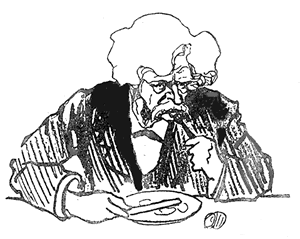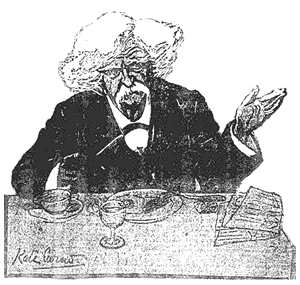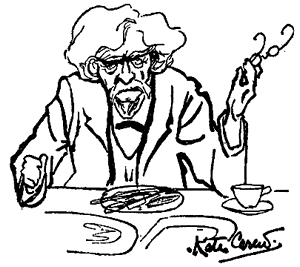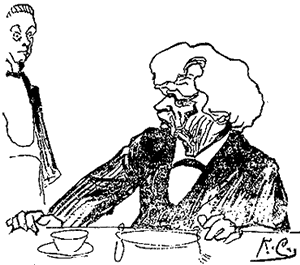

Home | Quotations | Newspaper Articles | Special Features | Links | Search
New York World, October 21, 1900
And Kate Carew's Impressions of the Great Humorist.
An Interview in Which He Refuses to Be Interviewed
Eluding the Subject Proposed, He Talks About Almost Everything Else, Including
Truth, Waiters, Early Breakfasts, Wisdom and Noise.
The World's clever caricaturist, Kate Carew, was sent the other day to get Mark Twain's impressions of America.
"As he has been away from the United States for some years," said the editor, "you might get him to express himself just as if he were a foreigner coming here for the first time.
"Have him tell what he thinks about the bay, the Statue of Liberty, the policemen, the manners of the people, the hotels, the cabs, bootblacks, fashions, the theatres and everything else that has interested him in New York."
Here is the interview which Miss Carew obtained, in which he
talks about nearly everything else.
By MISS KATE CAREW
|
"The trouble with us in America," said Mark Twain, "is that we haven't learned to speak the truth." He was sitting at breakfast opposite an exceedingly embarrassed young woman who was taking pains to keep her pencil and sketch book below the level of the table, because she did not wish to elicit the curiosity of the waiter--though he would be a bold waiter that betrayed curiosity in the presence of Samuel L. Clemens. What led up to the remark about truth was that others were clamoring to see Mark Twain, and the embarrassed young woman had ventured to say: "Don't you find that one's time is more respected on the other side?" "Well, yes," he replied, after a pause occupied in carefully breaking the end off a roll--and I wish I could convey the solemnity of utterance and the long, oft-broken drawl. "Well, yes. I guess--perhaps --it is. Now--in London I always had--a--regular time set for my self. But there--I'd--go--'way down into the--city--and people-- would know where to find me, and wouldn't--know--my other-- address. "Except friends, of course--but then--no one would think of calling--at ten in the morning--there; and if--they did--one wouldn't hesitate--to--say--'I'm at--breakfast'--or--'I'm--about--to breakfast' "But here--well, of course--our--friends--are anxious to see--us, and they--come--whenever--they think they can--find us. And--the--trouble with us in America is we haven't learned how to--speak the--truth--yet. |
|
"If we had it would be--a--pleasure--for me to--tell--my friend--that he was intruding, and he would be--benefited--and not injured.
"Now, it is an--art--high art--to speak the--truth--so that the object does not object--does not become offended. The trouble--is--with our social laws. The only--way to get reform is to--educate-- both sides--one to--give, the other to--receive; one to tell the truth, the--other to--listen to it without--getting--mad."
 |
A pause. A longer pause than usual. An abominably protracted pause. A pause hovering on the abyss of irretrievable silence. Heavens! Would he say no more? He whom it had been so much trouble to coax into speaking at all? It was a desperate chance. I broke in, hardly knowing what I was saying: "But I always thought that the art was in telling lies, and--and telling the truth seems so easy!" |
The waiter flitted forward, and then vanished, like a wraith, with an empty dish. Mark Twain took a mouthful of coffee and carefully dabbed his mustache with his napkin. I was admiring his hands--delicate, pinky-white hands matching the pinky-whitecheeks of a wholesome old man.
 |
"Don't believe it," he said, dropping his napkin to his knee. "Lying--is not an art--not that I have ever been able to--discover--and I have--tried--hard all my life. It is a--device--of primitive intelligences. The best--liars--are savages and--children. The most cultured--people--speak the truth as often as they--think about it, and enjoy--hearing it spoken by--others. In heaven I shouldn't wonder but they--use--the truth--most of the time." |
I had been listening too hard to do much work, though there was never a more tempting head for pencil or brush than this silver crowned one. He observed my inertia, and inquired, with a touch of fatherly reproof:
"Are you getting--what--you wanted?"
"Not much," I replied, all confusion. "Only a few notes."
"Notes!" He half rose from his chair. "Notes!" There was a sudden drawing down of his shaggy eyebrows.
"An artist's notes, you know," I hastened to explain. "Just scratches on the paper--an eyebrow, a wrinkle, a coat collar."
He sank back, much relieved.
"Make all the notes--that kind of notes--you want to," he said. "So long as--you--don't interview me, I--don't care. I won't be interviewed. I don't--approve--of interviews; don't like them--on-- principle."
This was not a very good omen for further conversation. I tried him on Vienna, having caught a glimpse of him there two years ago. This recollection of mine did not excite him perceptibly. I remarked that it was a beautiful little city. Yes, beautiful, he confessed into his mustache. I told him how my travelling companion and I had felt tempted to speak to him, but had found ourselves incapable of taking such a liberty.
"You might--just--as well," he said, with a vague look in the eyes which suggested memories of other travelling Americans who had been less diffident. "That would have--been--all right." He waved a reminiscently hospitable hand. "I would not have hurt--you."
Of his experiences in Vienna and his friendships there--not a word. Paris, London--the same.
New York? If I could only get this most taciturn of humorists and philosophers to tell his impressions of America--not a whole budget of impressions, just one or two tiny ones that might escape his determination not to be interviewed!
Ah, what a master of the art of silence is Mark Twain! The skyscrapers? Not a word. The torn-up streets? Not a word. Rapid transit? Not a word. Politics? Not a word. Noise? Let me see.
 |
"Don't you find New York very noisy after the quiet of European cities?" I ventured. "No; it doesn't annoy me," he said. "I don't--hear it. You don't have to hear--noise--unless you want to. The only time I hear the elevated--is--when it--stops." |
The waiter flitted back with a note. Another caller.
|
"They don't do this--sort of--thing--in London," he remarked. "There one can--breakfast--between 10 and 12 in beautiful--safety. I don't know why I breakfast at--the same hour--here. It's just habit, I guess. The early breakfast habit is one of--the American institutions--I admire most--when I am abroad. "But these early morning--calls--are meant in a kindly spirit. They touch my heart, even when--the coffee gets--cold." It would be impossible to exaggerate the composure and gravity with which Mark Twain utters his quaintnesses--and I'm sure he wasn't in much of a mood for quaintnesses that morning. There is no after-gleam of self-appreciation, no swift glance to see how his point has "taken." I am sure he does not try to say funny things, only he sees life through a glass that distorts every fact into a paradox. Or perhaps it is the serious people that have a distorted view of life. I wish Mark Twain would say what he thinks about it. |
|
You can't imagine anything more solemn than the atmosphere he carries with him. I, in my innocence, had pictured to myself one who would be surrounded with faces wreathed in smiles. In fancy I had heard waiters giggling behind their napkins and seen the hotel clerk with a broad smile repeating "Mr. Clemens's latest" to an admiring circle.
But, bless your heart! they all walk on tiptoe and speak in awed whispers when Mr. Clemens appears. His long residence abroad has taught him to expect the ministration of servants whose parents were servants, who will be servants all their lives, and whose children will be servants. Europe spoils many good Americans for the free and easy "help" of their own dear land, and I fancy that Mark Twain finds it so.
He had occasion to send for the head waiter and ask him why something hadn't been done, or why it hadn't been done sooner. He didn't scold, he just said:
"You understand, it's better--for me to--know--about these things, so I'll know what to do about it next time."
|
The tremulous head waiter explained that there had been some thing the matter with the speaking-tube by which the original order had been transmitted. "Oh, that was it, was it?" said Mr. Clemens. "I just wanted to--know." And then, turning to me, he added: "I don't suppose we--have a right--to know as much as cooks and--waiters, anyway." |
 |
They know him now, after having him with them for a week, and it's safe to say that there isn't a person in New York better waited on than Samuel L. Clemens, who has made more people laugh than any other living man.
More about Kate Carew and her Mark Twain interview

Home |
Quotations | Newspaper Articles
| Special Features |
Links | Search